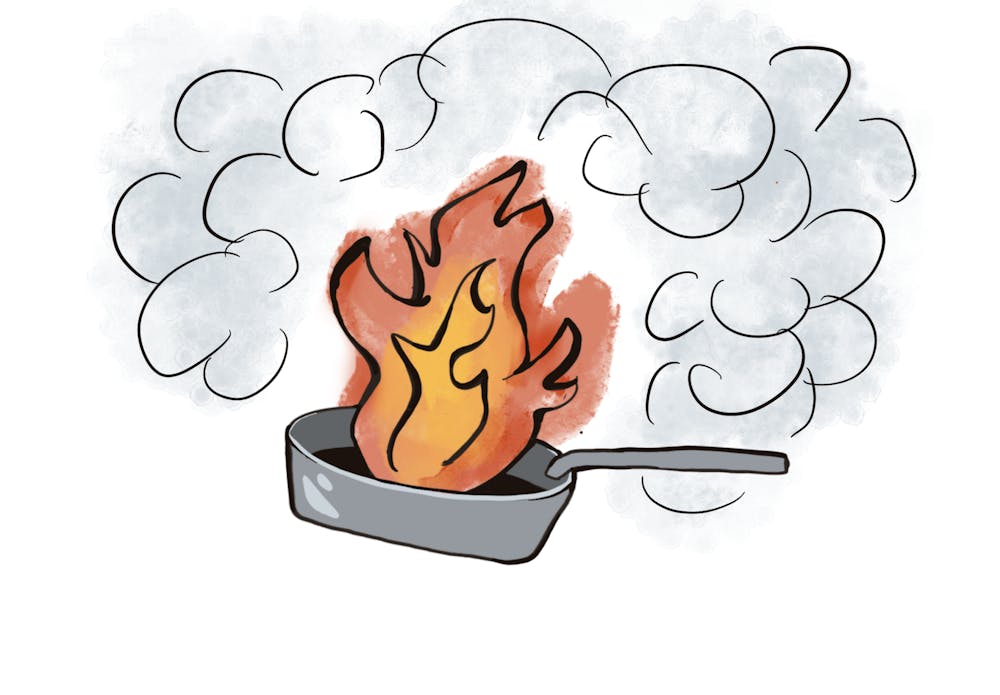Eating good food on a daily basis can be important for staying sane and feeling healthy in college, especially when you’re leaving home for the first time. While the buffet-style meals and unlimited desserts of the dining halls may seem like luxury on your first week, by the start of classes you’ll probably be craving something that reminds you of home.
I’ve always felt that a homecooked meal is the only thing that soothes a bout of homesickness. When I’ve had a rough day, or when I’m exhausted and don’t want to think anymore, I cook one of the meals my mom taught me. The act of preparing and combining ingredients to make a physical product makes me feel more grounded and clear-headed. For me, joy lives in a bowl of congee or a plate of stir-fried eggs and tomato over rice.
The first step to cooking is to buy some ingredients. The most convenient option is CharMar, a tiny grocery store in the Wolman dorm building and the only place where you can use dining dollars to buy groceries. They have a decent selection of frozen foods and snacks, though their meat and produce sections are limited.
Another convenient place to buy groceries is Streets Market, which is a 2 minute walk from the Barnes & Noble on St. Paul Street. It’s a relatively small grocery store, but it should have everything you need for most cooking projects. It also has a small selection of Asian groceries as well. Although it tends to be more expensive than your standard grocery store, it’s an easy walk from the dorms.
The nearest big-name grocery stores are Giant and Safeway. Though there is a walkable Giant on E. 33rd Street, students often take the Blue Jay Shuttle to the Giant on W. 41st Street instead. Safeway is a bit far but still walkable and with similar prices. Wherever you go, just remember to bring your reusable grocery bags since single-use plastic bags are banned in Baltimore.
If you find yourself living in Wolman or McCoy, then congrats! You’ll have a kitchenette to share with your suitemates; it consists of a stovetop, sink and small fridge, which gives you a lot of freedom in the type of foods you’ll be able to prepare. Of course, for anything requiring baking or roasting, you’ll need to go make sure that the oven in the common kitchen is available (every dorm has one).
If you don’t have a kitchenette, you’ll have to get a bit more creative. A microwave is a pretty essential piece of equipment. An electric kettle is great too if you want to make tea, coffee or ramen in your dorm. The important thing is just to have some method of heating foods or liquids in your dorm. You can never underestimate the psychological comfort of a hot meal, eaten quietly in the relative privacy of your own room.
You can steam most vegetables in the microwave if you cover them with a few layers of wet paper towels, so long as you cut them into small pieces and check to make sure the water hasn’t completely evaporated off. Microwaving bacon is the same method, minus the water.
But if you’re truly a culinary novice, then here’s all you need to know. Don’t touch things that are hot and don’t touch things that are sharp. Overcooked chicken is preferable to salmonella. And food that smells or tastes rotten should probably get thrown away. Never put water on a grease fire — if you fail to follow this advice, you may need to fend off any pre-med friends or roommates who will inevitably try to give you questionable medical care.
Beyond that, experiment! There are no failing grades in the kitchen. The worst thing that can happen is that the food doesn’t taste good. The best way to get a good sense of food is by knowing how to avoid mistakes and you learn to avoid mistakes by making them.
I’d recommend keeping a few convenient meals stashed away in your kitchenette or dorm. I’m talking instant ramen, canned tomato soup, Kraft Mac & Cheese, frozen TV dinners or boxes of sugary cereal. During bad weather or on lazy days when you can’t be bothered to walk to the dining hall, these will be a godsend.
But in terms of teaching you how to cook, there’s nothing I could say in this short article that would get you through the semester on its own. My best advice is to watch your family members while they’re cooking the next time you go home. Take notes, even if they tease you about it. If there are any specialized ingredients that you won’t be able to find in an American supermarket, be sure to bring them back to Baltimore with you.
If your family lives within driving distance, ask them to prepare a few of your favorite foods for you, and freeze them in takeout containers. Stash them in the communal kitchen freezer (with a post-it note that says “NO TOUCHY” on it for extra security) and thaw them when you’re feeling homesick.
Food is important. Studies have repeatedly shown how deep the connection between smell and emotional memory is. When you’re living on your own for the first time, it can feel daunting to try to cook for yourself. But I promise you, it’s a skill that you can get the hang of. Just like anything else in college, it might feel a bit scary and awkward at first, but you’ll get used to it. So, go ahead and break a few eggs! Bon appetit!





